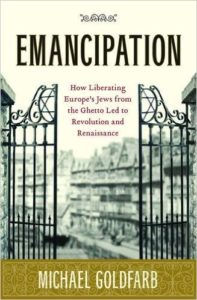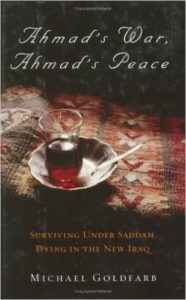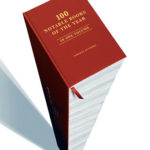Michael has written…
Emancipation
“A well-researched and beautifully written masterwork that reveals the liberating impact that the French Revolution and Napoleon forces had on the Jews of Europe.”
For almost 500 years, the Jews of Europe were kept apart, confined to ghettos. Then, in one extraordinary moment in the French Revolution, the Jews of France were emancipated. Soon Napoleon opened ghetto gates all over Europe. The era of Emancipation had begun. What happened next would change the course of history.
Emancipation tells the story of how this persecuted minority emerged from the ghetto and against terrible odds very quickly established themselves as shapers of history, as writers, revolutionaries, social thinkers and artists. The story is told through the lives of the people who lived through this momentous change. Some are well-known: Marx, Freud, Mahler, Proust and Einstein; many more have been forgotten. Michael Goldfarb brings them all to life.
This is an epic story and Goldfarb tells it with the skill and eye for detail of a novelist. It is a tale full of hope, struggle, triumph and waiting at the end, a great tragedy.
Emancipation will have meaning for anyone interested in the struggle of immigrants and minorities to succeed. We live in a world where vast numbers are on the move, where religions and races are grinding against each other in new combinations. This a book of history for our time.
Reviews & Reaction:
“His book is a celebration”
Marc Tracy, The New York Times“Goldfarb, by his own admission, is not a historian but ‘a journalist, a summarizer and simplifier by trade.’ Whatever he calls it he writes riveting prose.”
Ruth Wajnrib, Sydney Morning Herald“In Emancipation… Michael Goldfarb offers a well-researched and beautifully written masterwork … At a time when global xenophobia is too much with us, it is rewarding and even nourishing to read about how the closed doors of divisiveness can be opened wide, even when the key turns out to be held in unexpected hands.”
Vartan Gregorian, President, Carnegie Corporation of New York
Ahmad’s War, Ahmad’s Peace: Surviving Under Saddam, Dying in the New Iraq
Goldfarb does a fine job of recounting the heady days of Mosul’s liberation, and the collapse of the American-backed efforts to create a liberal society before the onslaught of the insurgents.
In a house that can never be his home, in a city that is not his place of birth, at the hour before day break, Ahmad Shawkat is waiting for the destruction of Saddam Hussein. Even though American troops are at the borders of his country, Iraq, Ahmad fears that it will never happen. Little does he know that before this day is over, the war to overthrow Saddam will begin and he will meet the man who will change his life forever.
Set against the backdrop of the Iraq war, Ahmad’s War, Ahmad’s Peace: Surviving Under Saddam, Dying in the New Iraq, is the tale of a deeply flawed hero and his lifelong struggle to live in freedom. Written with passion and genuine beauty, this is a story of a friendship that bridges cultures and of love across the generations.
Reviews & Reaction:
“Goldfarb does a fine job of recounting the heady days of Mosul’s liberation, and the collapse of the American-backed efforts to create a liberal society before the onslaught of the insurgents. That failure has been documented elsewhere, but it is particularly stinging to witness through the eyes of someone like Shawkat, who tried so hard to construct a more humane Iraq.
Shawkat was one of the good guys, and now he’s dead, shot in the back on a rubbish-filled rooftop. It is one of the more pressing questions of our day whether the democratic experiment in Iraq can survive without more people like him.”
Dexter Filkins, New York Times“Michael Goldfarb’s Ahmad’s War, Ahmad’s Peace: Surviving Under Saddam, Dying in the New Iraq should be read by anyone who wants to understand the bitter disappointment felt by liberal Iraqis as the hope for a better future after Saddam vanished, thanks both to American incompetence and the indigenous forces unleashed by the invasion. Goldfarb contrasts the casualness with which the Americans approached the occupation with the deadly consequences for his friend.”
New York Review of Books


